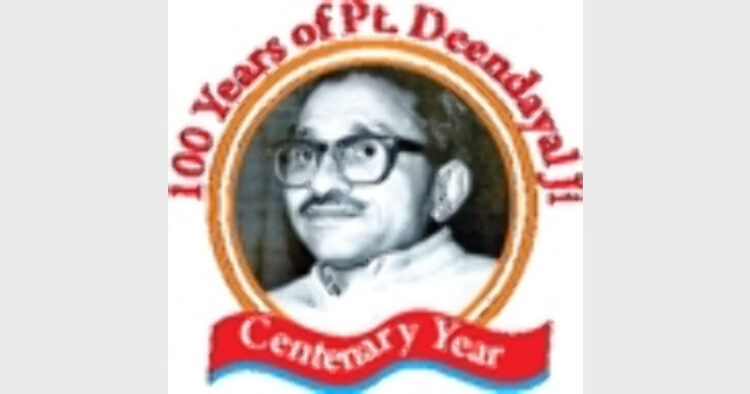Unlimited use of wealth for material pleasures and uncontrolled use of political power cause mental, intellectual and spiritual deterioration in individuals as well as in society
As a natural instinct, human being wants independence in all walks of life (political, economic and social) which are interdependent with one other. Deendayalji put forwarded a system of democracy wherein each citizen can produce and consume according to one’s own desire without hurting others’ economic life. It is the duty of the state to ensure that each citizen has opportunity to work and earn one’s living by providing necessary facilities. At the same time if a person is unable to work, it is the duty of the state to ensure his minimum needs.
But in the Communist nations, the states have guaranteed right to work but restricted the freedom of its citizens. This is not suitable to democracy where people should be ensured the freedom of production and consumption. But in capitalism due to the excessive competition the law of jungle will prevail. The great thinker Renelop has said “Democracy has promoted many aspects of freedom to human beings. But it has also procured ‘economic man’. Capitalism and socialism both have attempted to make this economic man the most prosperous man. In this effort, his humanness and happiness have been, however alienated”. In this context Deendayalji opined that ‘capitalism and socialism both have concentrated their aim on the material forms and desires thereof’. Since westerners have abundant faith in science and technology as the source of prosperity, they focussed only on abundant production. Beyond that they neglected the needs of happiness by the members of the society. By increase in the production to the maximum level, some people are suffering from freedom and some others are enjoying freedom. So capitalism and socialism prefer the concentration of power by few in the society. The labour class, one of the factors in production, earns its living and serves the social needs and the small traders, disappear in this process. So Deendayalji preferred the Arthayam to preserve their economic freedom in economic democracy.
Deendayalji supported trusteeship theorem by framing some legal and moral mechanism. In his opinion, similar to Gandhiji’s, abolition of private property is impractical. This may cause destruction of personality, security, happiness and enterprise of individuals. But for life and living humans need wealth. Unlike western concept, Panditji says that Nature itself is the wealth of human beings. Human beings can try to obtain it for livelihood only. But if the need for material wealth is exceeding natural limits of human beings, they will deviate from ethical behaviour. Though the material wealth is necessary for spiritual evolution, it should not go beyond the limit. Deendayalji says “unlimited use of wealth for material pleasures and uncontrolled use of political power cause mental, intellectual and spiritual deterioration in individuals as well as in society. When economy and politics go together in this direction, destitution is the result”. Deendayalji emphasised that the consumption of wealth should consider necessities and comforts and not luxuries. This discretion should govern the allocation of natural resources in the economy. For that, people are necessarily expected to work out themselves in this direction based on education and orientation of ethical values which are to be cultivated. Men in Nature imply two relationships. Man in relation with man and the other is all men to the wealth as materials available in Nature. For a question of what ought to be the paradigm of the economy, Deendayalji provides us guidance. Our economy should be such that humanness would ascend, that it will not ever disappear and further that we march from our human consciousness towards the consciousness of godly existence. The goal should govern our activities in planning, regulation, control and institutions in the economy. It is necessary to keep in mind the limits of economy to reach the goal. People’s livelihood, development along with the formation of a nation, its progress etc. need basic means for existence. This should be the goal of economic theories. Deendayalji has said, ‘The natural resources that we use are limited. The means of production therefore are limited. Man could use alternative resources for the production of one particular commodity. However, it would not be wise to waste resources in an irrational manner considering the long-term needs.’ “Nature has its equilibrium. This is maintained by natural cycle of ever-going change. Nature renews its depreciation and losses by its own processes. However, man is destroying Nature as if the whole of its resources are meant for his own existence. In the mad race to produce maximum of agricultural and industrial commodities, we have lost the foresight’.
Dr Umadevi S (The writer is Associate Professor in
Political Science, Sanatana Dharma College, Alappuzha)













Comments